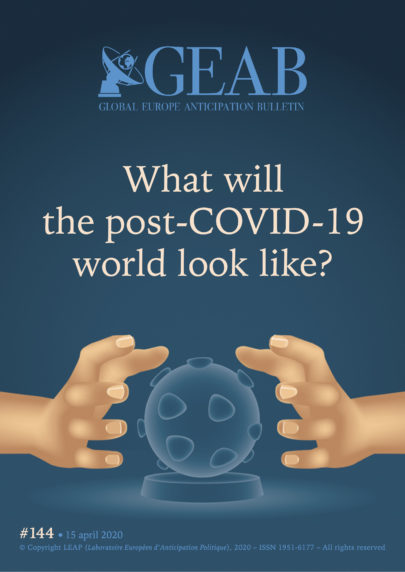GEAB 144

For the past few weeks, the planet has been in a state of emergency; people are locked into their homes and the economy is in a state of hibernation. As stated in last month’s GEAB, our team sees this as part of the transition towards the “world after” and it is significant that the event that is causing this dramatic shift is not a major natural catastrophe (volcano, tsunami, meteorite, …) nor a nuclear world war … but a pandemic. The old sick system has been broken by a health crisis, so health is now the centre of attention.
Practically all major countries are currently struggling to make it through the peak phase of the pandemic. The nature of the virus is forcing them to take exceptional measures, unimaginable just a few weeks ago. The point of the globally implemented social distancing (including the near complete shutdown of global transport of people) is to prevent a situation where our health systems get completely overwhelmed.
Without these drastic measures, the combination of both the contagiousness and the nature of this illness would result in dramatically more people having to be treated in ICUs in a short period of time. ICUs not only require ventilators, but also other resources – most importantly, trained doctors and nurses and specific measures to ensure their “safe” operation. What we are aiming to prevent is an implosion of our national health systems, which could be so severe that it would jeopardize the healthcare of populations for years to come.
Login

Political anticipation is LEAP’s method of “rationalisation of the future”. In fact, it is very close to the “historical method” in the sense that it is accessible to all and [...]
Since 2008, the GEAB has been talking about the ‘world after’. Now everyone is using this expression. It is therefore time to archive the ‘global systemic crisis of 2008-2020’. The [...]
“In 2020, a global pandemic called COVID-19 brought the world economy to a virtual standstill for several months. To contain the epidemic, governments had to take radical measures to contain [...]
Many people will see their dreams of radical change disappointed. Yet there will certainly be change! You don't need to be an eminent guru to understand that the 8 trillion [...]
While the need for the digitalisation of the international monetary system described earlier is being reinforced by the financial crisis triggered by the pandemic, one finds in many articles on [...]
Is the US oil industry undergoing a significant shift in its relationship with its government, now accepting levels of influence or direct control that would have been unthinkable only a [...]
Businesses - Don't expect a normal recovery in September! A growing proportion of economic and service players are aware of this, but it is worth hammering home the fact that [...]


Comments